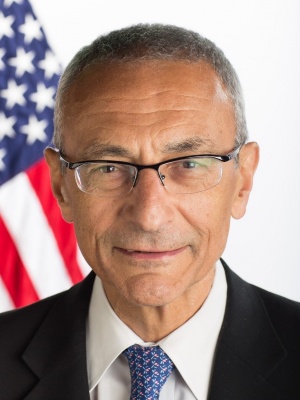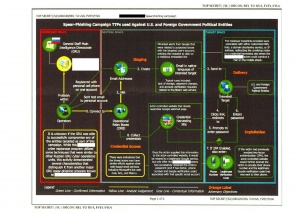Hacking the 2016 US Presidential Election
In early 2016, the Russian Federation began a coordinated hacking effort against the Democratic National Committee and then Presidential candidate Hillary Rodham Clinton. [1] This was a part of a larger effort to influence the 2016 Presidential election. Hackers used a diverse range of methods to gain access to confidential emails. In addition, they targeted election systems in numerous states. Close to 150,000 emails were stolen by Russian government- backed hacking groups and were posted online. [2]. It is not believed that efforts to affect voting systems were effective, but intelligence officials still have doubts.
Contents
Hacking of DNC and Hillary Clinton
The first hacks began in March 2016. [3] . Clinton staffers and volunteers began to be targeted through email phishing. Over the course of five days, dozens of target emails were sent out. Phishing is when hackers send out malicious emails that trick users into giving sensitive information. One common method is asking users to reset their password for their email through a phony form that sends credentials to a hacker. Through this process, the hackers were able to gain access to the email of John Podesta, who was Clinton’s campaign chairman at the time. Using credentials gained from phishing, the hackers were also able to log in as System Administrators on the Democratic Congressional Campaign Committee (DCCC) five days later and then, using information from there, the Democratic National Committee (DNC) network. Once on the networks, the hackers used Minikatz to collect login credentials, X-Agent to take screenshots and log keystrokes, and X-Tunnel to send information back to hacker-controlled servers. The data first went to middle servers hosted in Arizona. In the Mueller report it was stated that these servers worked as a buffer to avoid detection. [4] All the tools used were open sourced and readily available to the public. The stolen information was distributed first in June 2016 through a created website, DCLeaks.com. These leaks were claimed by a hacker going by the moniker “Guccifer 2.0”, who claimed to be a lone Romanian. Eventually, Guccifer 2.0 got in contact with WikiLeaks. WikiLeaks asked for new material that could be released at the Democratic National Convention in order to sow discord. Thus, in late July, Wiki Leaks started releasing documents which included 20,000 of the Podesta emails. After 2016, it was found that two divisions directly connected to the Russian Military Intelligence Service (GRU) had been directly connected to the email hacks. The group known as Fancy Bear comprised multiple units with distinct tasks to interfere with the U.S. elections. In the Mueller report, Unit 26165 was blamed for overseeing hacking the DNC, while Unit 74455 oversaw disseminating and publishing documents stolen in the hack. It was also found that Brittany Kaiser at Cambridge Analytica met Julian Assange of Wiki Leaks in February 2017. [5] Reporters also discovered that, in 2016, Cambridge Analytica reached out to Assange asking to index and distribute the emails that had been stolen. In October 2018, multiple GRU officers were charged by the Department of Justice with hacking and disinformation. [6]
Hacking of Voting Systems
In July 2019, the Senate Intelligence Committee concluded that, in 2016, election systems in all 50 states were target by hackers tied to the Russians. [7] The report concluded that no evidence of votes being changed was evidenced. But there was a strong belief that Russian Intelligence may have found a way into voting systems and had possibly decided not to act. It was revealed that close to ten phishing emails were sent to local election officials days before the 2016 election, and at least one U.S voting software company was targeted. Local election officials were sent emails pretending to be from voting software companies to open Microsoft Word documents with malware. Through this, hackers possibly gained access to the voting systems. A leaked NSA report indicated that Russians may have penetrated voting systems further than previously understood. [8]It is unknown, however, the extent and effect of these hacking efforts.
Ethics
Hacking of personal emails, along with undermining election integrity and authenticity, poses a serious ethical issue. Citizens have the right to privacy, honesty, and authenticity. What we email to our co-workers, for example, is not for others to see, barring governmental investigations. Furthermore, a person’s vote should count and not be modified. Hacking into emails and election systems is extremely unethical and morally wrong.
Privacy
According to James Rachels in his paper “Why Privacy is Important”, privacy is what allows for a variety of different relationships. By disclosing different parts of ourselves and acting in different ways depending on who we are around, we can have diverse personal relationships. Without privacy, these variety of relationships would not exist. In the case of Clinton’s emails being released, this revealed her distinct relationship with Clinton Foundation donors, with Wall Street, and with her staffers.[9] The way politicians communicate with donors and staff is very different from how they would communicate with the public or even with their family. The result was that it painted a certain picture of Clinton for the public and, according to Rachels’ idea, it limited the type of relationships she could form with voters. Any hacking of personal information is ethical wrong, therefore, because it infringes on our privacy -- which is a basic human right.
Integrity and Authenticity
In his paper, Authenticity and Integrity in the Digital Environment, Clifford Lynch defines integrity as has the data in question not been corrupted over time and transit, and authenticity as is the data in question what it claims to be? This basically is saying, has the data been changed and is the data from who it says it is from. According to Lynch, it is very difficult to determine if data has integrity unless one has a copy to which to compare it. In the case of electronic voting, however, there is no paper trail with which to compare electronic data. In the case of authenticity, in order to believe that data is coming from actual voters, we put trust into electronic voting systems. No system is safe from hacking and intrusions, however. As a voter, though, one assumes that one’s vote will be counted and not be changed. So, indeed, agents without the voters’ best interest in mind are ethically wrong. The key to counteract this is to have stronger security principles in place. That is why, in 2019, Michigan Professor Halderman made the important recommendation that 370 million dollars in federal funding to replace outdated voting machines. [10]
References
- ↑ “Russian Interference in the 2016 United States Elections.” Wikipedia, Wikimedia Foundation, 3 Mar. 2020, en.wikipedia.org/wiki/Russian_interference_in_the_2016_United_States_elections.
- ↑ Balsamo, Michael. “Thousands of Emails Stolen from Republican Committee's Aides.” AP NEWS, Associated Press, 5 Dec. 2018, apnews.com/cdcda481c0574b4da214703000e350b8.
- ↑ Chang, Alvin. “How Russian Hackers Stole Information from Democrats, in 3 Simple Diagrams.” Vox, Vox, 16 July 2018, www.vox.com/policy-and-politics/2018/7/16/17575940/russian-election-hack-democrats-trump-putin-diagram.
- ↑ Whittaker, Zack. “Mueller Report Sheds New Light on How the Russians Hacked the DNC and the Clinton Campaign.” TechCrunch, TechCrunch, 18 Apr. 2019, techcrunch.com/2019/04/18/mueller-clinton-arizona-hack/.
- ↑ Cadwalladr, Carole, and Stephanie Kirchgaessner. “Cambridge Analytica Director 'Met Assange to Discuss US Election'.” The Guardian, Guardian News and Media, 7 June 2018, www.theguardian.com/uk-news/2018/jun/06/cambridge-analytica-brittany-kaiser-julian-assange-wikileaks.
- ↑ “U.S. Charges Russian GRU Officers with International Hacking and Related Influence and Disinformation Operations.” The United States Department of Justice, 4 Oct. 2018, www.justice.gov/opa/pr/us-charges-russian-gru-officers-international-hacking-and-related-influence-and.
- ↑ Sanger, David E., and Catie Edmondson. “Russia Targeted Election Systems in All 50 States, Report Finds.” The New York Times, The New York Times, 25 July 2019, www.nytimes.com/2019/07/25/us/politics/russian-hacking-elections.html.
- ↑ Esposito, Richard, et al. “Top-Secret NSA Report Details Russian Hacking Effort Days Before 2016 Election.” The Intercept, 5 June 2017, theintercept.com/2017/06/05/top-secret-nsa-report-details-russian-hacking-effort-days-before-2016-election/.
- ↑ Stein, Jeff. “What 20,000 Pages of Hacked WikiLeaks Emails Teach Us about Hillary Clinton.” Vox, Vox, 20 Oct. 2016, www.vox.com/policy-and-politics/2016/10/20/13308108/wikileaks-podesta-hillary-clinton.
- ↑ Crang, Steve. “Election Security: Halderman Recommends Actions to Ensure Integrity of US Systems.” Michigan Engineering, 27 Feb. 2019, news.engin.umich.edu/2019/02/election-security-halderman-recommends-actions-to-ensure-integrity-of-us-systems/.

